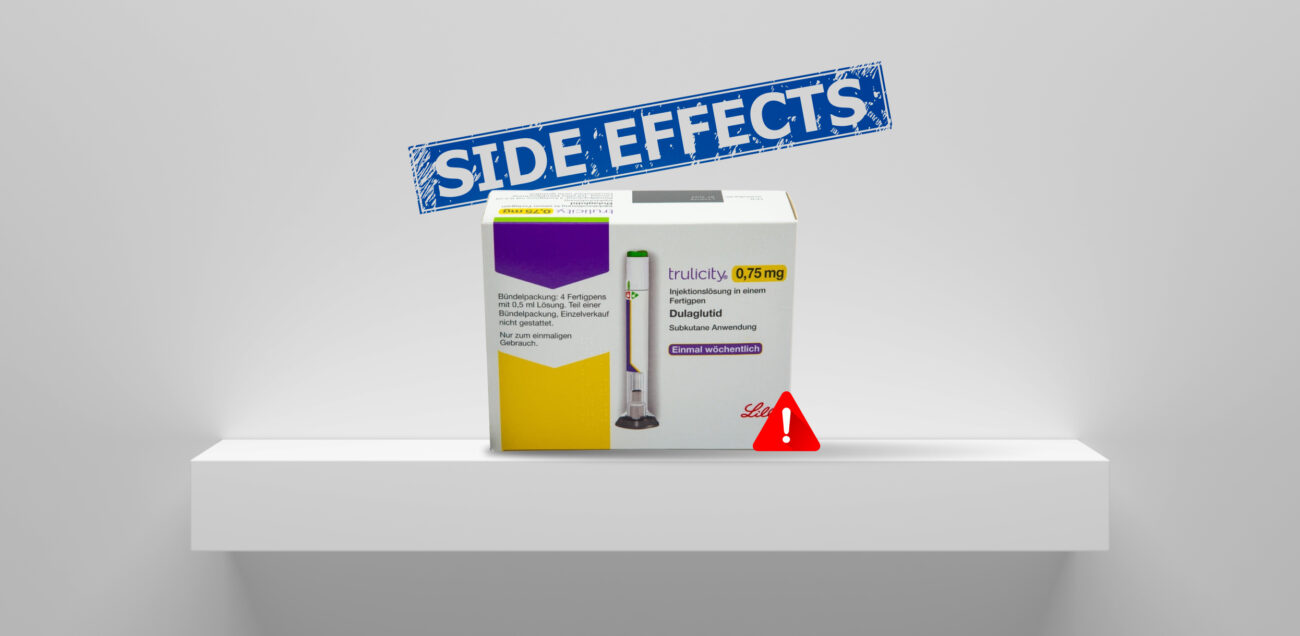Trulicity, a popular prescription medication for managing type 2 diabetes, can help regulate blood sugar levels. However, like most medications, side effects of Trulicity may occur in some individuals. This article aims to provide a detailed look at the potential side effects of Trulicity, how to identify them, and when to seek medical advice.
If you or a loved one is taking Trulicity, it’s important to stay informed about its possible effects and know when to get professional guidance. Book a free consultation session with Our Expert for personalized advice on managing Trulicity side effects.
What is Trulicity?
Before diving into the side effects, it’s essential to understand what Trulicity is. Trulicity is a GLP-1 receptor agonist that helps people with type 2 diabetes control their blood sugar levels. It works by mimicking the natural hormones in your body that help regulate insulin production.
Common Side Effects of Trulicity
The side effects of Trulicity vary from person to person, but most are mild and manageable. Below are the most frequently reported side effects:
1. Nausea
One of the most common side effects of Trulicity is nausea. Many patients experience nausea when they start the medication, but it often decreases over time as the body adjusts to the drug.
2. Diarrhea
Diarrhea can also occur as a result of taking Trulicity. This digestive side effect may be temporary, but if it persists, consulting with a healthcare professional is recommended.
3. Abdominal Pain
Some patients report experiencing abdominal pain or discomfort while on Trulicity. This can range from mild cramping to more intense pain in the stomach area. Again, these symptoms often lessen after the body becomes accustomed to the drug.

Less Common Side Effects of Trulicity
While less common, there are more serious side effects of Trulicity that some patients should be aware of:
1. Pancreatitis
In rare cases, Trulicity has been linked to pancreatitis, an inflammation of the pancreas. Symptoms of pancreatitis include severe abdominal pain, nausea, and vomiting. If you experience any of these symptoms, contact your doctor immediately.
2. Kidney Problems
Another rare but serious side effect is kidney problems. Trulicity can cause dehydration in some patients, leading to kidney issues. Symptoms of kidney problems may include changes in urination, fatigue, and swelling in the legs or feet.
3. Allergic Reactions
Though infrequent, some people may experience allergic reactions to Trulicity. This can include rashes, itching, and swelling of the face, throat, or tongue. Immediate medical attention is needed if an allergic reaction occurs.
Long-Term Side Effects of Trulicity
When considering long-term use of any medication, understanding its possible lasting effects is essential. The long-term side effects of Trulicity are still being studied, but some of the concerns include:
1. Thyroid Tumors
There have been concerns about the potential risk of developing thyroid tumors with long-term use of Trulicity. While this has mainly been observed in animal studies, it’s still a topic that needs further research. If you have a history of thyroid issues, discuss this with your doctor before starting Trulicity.
2. Gallbladder Issues
Long-term use of Trulicity could also increase the risk of gallbladder problems. Some people have reported symptoms such as upper right stomach pain, fever, and yellowing of the skin (jaundice), which can indicate gallbladder disease.
How to Manage Side Effects of Trulicity
If you are experiencing side effects of Trulicity, there are several steps you can take to manage them effectively:
1. Stay Hydrated
Staying hydrated is crucial, especially if you’re dealing with side effects like nausea or diarrhea. Drinking water can help manage dehydration and ease some of the digestive issues caused by Trulicity.
2. Eat Small Meals
For those experiencing nausea, eating smaller, more frequent meals may help reduce discomfort. Avoid heavy, greasy foods, as these can make nausea worse.
3. Monitor Your Blood Sugar
Some side effects may be tied to changes in your blood sugar levels. Keep a close eye on your levels and report any significant fluctuations to your healthcare provider.
When to See a Doctor
It’s essential to recognize when side effects of Trulicity require immediate medical attention. Seek professional help if you experience:
- Severe abdominal pain that doesn’t go away
- Signs of an allergic reaction, such as swelling or difficulty breathing
- Unusual changes in urination, fatigue, or swelling, which could indicate kidney problems
If you are concerned about any side effects you’re experiencing, book a free consultation session with Our Expert. We can help guide you through managing the side effects of Trulicity and ensure that your treatment plan is right for you.
Can Trulicity Be Right for You?
Trulicity has helped many individuals with type 2 diabetes manage their blood sugar levels effectively, but it’s not without its challenges. Understanding the potential side effects of Trulicity and how to manage them can make a significant difference in your treatment experience.

